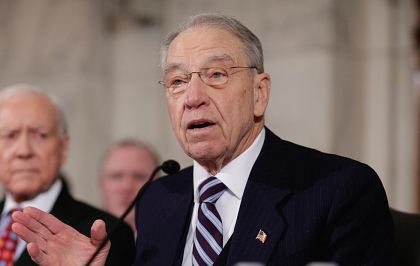
On March 22, Sen. Chuck Grassley (R-Iowa), chairman of the powerful Senate Judiciary Committee, asked a series of tough questions of the Department of Homeland Security regarding visa mills and has received a dozen pages of largely useless replies.
The responses to the senator's questions fall into three categories:
- Page after page of redactions, maybe useful to the senator, but hidden from the public;
- Repeated statements, when statistics are requested, that they are not yet available; and
- Pap and oblique discussions of standing government policies, with many legal citations.
The letter was signed by the departing Acting Director of the U.S. Immigration and Customs Enforcement, Thomas D. Homan. My suspicion, after years dealing with such communications, is the draft was prepared by the sleepy Student Exchange and Visitor Program (SEVP) staff and not really checked out by anyone other than civil servants.
Visa mills are DHS-licensed educational entities that seem more interested in issuing work permits to aliens than in educating them. The students, generally among the least talented of the foreign students in the United States, agree with these priorities. Most of the work permits provided come with federal subsidies, in the Optional Practical Training Program, subsidies that no U.S. citizen is eligible for.
DHS has shown little interest in weeding out these DHS-approved institutions, and when it has done so, it has worked very, very slowly. These visa mills are usually extremely profitable.
Redactions. The last half dozen lines on page 3 are covered by a solid black block, as are all of pages 5, 6, 7, and 8, and the first dozen lines of page 9. Well over a third of the letter consists of redactions, placed there by the agency, not the senator. No reason is given for them.
We do know, by comparing the March 22 questions with the black spaces, what DHS is not willing to tell us. It does not want to discuss how it deals with suspected visa mills nor, apparently, does it want to go public with any discussion of its leisurely treatment of two notorious, and now closed, such institutions.
These are Tri-Valley University and Herguan University in the San Francisco Bay area, both shuttered several years ago and, in the case of Herguan, only after the owner-president (Jerry Wang) had a long delayed federal trial, was sent to jail, and then was released.
One of the questions that was covered by darkened pages was this:
4 a. Herguan University: why did SEVP wait three years before decertifying the school?
i. How many I-20s [which lead to F-1 visas] did Herguan issue after Jerry Wang was indicted on July 24, 2012? What was the date of the last I-20 issued by Herguan?
The public has the right to know the answers, no matter how embarrassing to SEVP. There is no need for concern for either the university, which has long since closed, or Wang, who was released from jail years ago.
Statistics. There are no statistics at all in these replies, though the agency had more than two months to work on them. Perhaps the author of the non-responsive letter had a macro for this paragraph, which shows up repeatedly:
The request for this data has been submitted, but has not been received prior to the transmittal of this letter. The response will be forwarded to your office upon receipt and validation.
If this is the way SEVP deals with the chairman of the Judiciary Committee, think how it would handle an inquiry from a mere member of the United States Senate?
Pap. It is well known that most visa mill attendees are students at the master's level, and that they can start working off campus on the first day of school through the CPT (curricular practical training) program. For an example of the importance of this fact to incoming alien students, see this website.
Here is how DHS answered Sen. Grassley's question on this subject:
Governing regulations permit student employment and work-based training for students under the limited circumstances, as follows:
On campus employment: "[A]n F-1 student may not begin on-campus employment more than 30 days prior to the actual start of classes." 8 C.F.R. § 214.2(f)(9)(I).
Off-campus employment: Employment can begin "after having been in F-1 status for one full academic year provided that the student is in good academic standing as determined by the DSO." In emergent circumstances, the Secretary of Homeland Security "may suspend the applicability of any or all of the requirements of paragraph (f)(9)(ii) of this section by notice in the Federal Register." 8 C.F.R. § 214.2(f)(9)(ii)(A).
Practical training: "Practical training may be authorized to an F-1 student who has been lawfully enrolled on a full-time basis, in a Service-approved college, university, conservatory, or seminary for one full academic year." 8 C.F.R. § 214.3(f)(10)."
CPT: "Exceptions to the one academic year requirement are provided for students enrolled in graduate studies that require immediate participation in curricular practical training." 8 C.F.R. § 214.3(f)(10)(I). This encompasses graduate students whose practical, work-based training is integral to the program of study, i.e., the student cannot progress in the program until this practical training is completed.
So, nearly 100 words later the SEVP writer mentions the "exception" that in so many of the visa mills is the rule. (DSO, incidentally, means "designated school official", the person at the school who is supposed to handle the foreign student regulations.)
The decision regarding the "immediate participation" is made by the schools, and it probably results in more jobs in pizza joints than anywhere else, as the "work-based training" programs are, in fact, never really reviewed by SEVP.
I cannot speak for the senator, but if I were in his shoes, I might be annoyed to get such a useless set of replies — and from an agency run by his own party.
